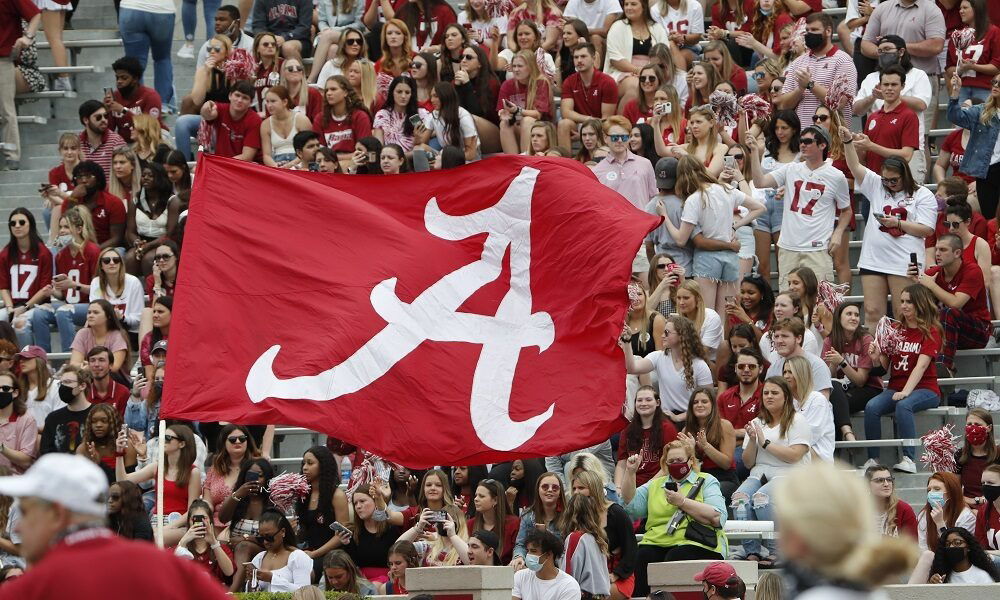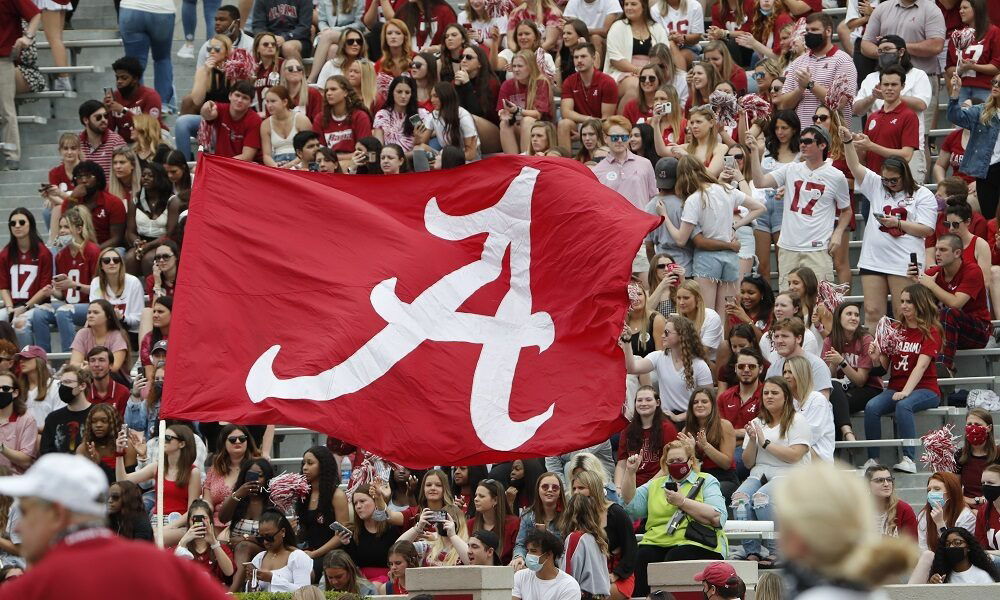



The House vs NCAA settlement might have guaranteed a huge payday for college athletes, but for some, it also means a different kind of challenge. Take the Alabama Crimson Tide, for example. With the university’s athletics department staring down a $28 million loss in 2023-24 and a $12 million hit the year before, paying $20.5 million NIL revenue to athletes would be less about celebration and more about plotting long-term survival. While Athletics Director Greg Byrne has worked toward bridging some of the gap by asking fans to donate to Yea Alabama (the university’s NIL collective), that’s hit somewhat of a snag, too.
Watch What’s Trending Now!
Many have alleged how Tide doesn’t care about its fans unless money is involved. So how does the AD intend to navigate the maze? Well, he’s ready to embrace the challenges with a little financial wizardry, and a robust give-and-take route. On June 9, speaking on WJOX-94.5’s McElroy & Cubelic In The Morning, Byrne laid out the path forward, after the host asked how the university intends to retain the fandom.
First, Byrne acknowledged, “The fans are critical. I know sometimes people say the athletics department doesn’t care about fans. That’s a bunch of hooey,” before diving into the path going forward in terms of financial sustenance. “One of the really good things now [is] we’ve been trying to encourage everybody to give to Yea Alabama….The collective part of donations are going to be very limited going forward. So what we’ve tried to convert Yea Alabama to…we’re in the process of doing is, more of a content site, marketing site,” the AD explained. What’s more? Nick Saban may no longer be pacing the sidelines, but his fingerprints are all over this latest strategy…
Byrne revealed how the legendary coach—still a powerful presence inside the building—helped shape this approach with a pointed reminder: “Coach Saban said to me multiple times in private meetings, and he has said it publicly, ‘The dinosaurs didn’t adapt’. We got to continue to adapt and evolve in what we’re doing.” The quote rings louder than ever as college football enters an era of revenue sharing, roster free agency, and shrinking margins. Alabama’s ability to survive depends on turning tradition into innovation—and fast. But what does a content and marketing hub entail?
In Byrne’s words, “When people give money, and the entry points are very low—I think it’s 25 bucks a month—they get content return.” Citing insider perks like breaking news and behind-the-curtain access, he also revealed, “We’ve broken a number of stories [through Yea Alabama]…hiring [OC Ryan] Grubb came through ‘Yea Alabama’. We just signed Rob Vaughn, contract extensions came through ‘Yea Alabama’. Then we’re kind of giving behind-the-curtain access to the program so people feel, ‘Hey, [this is] is something I can’t get anywhere else’.” Looks like Alabama’s not just selling football anymore. It’s selling access, stories, and a sense of belonging.
Byrne emphasized, “We are trying to evolve with what the services that we offer to our fans [are]. And at the same time, too, we have to make sure the fans understand why we are changing the way we did.” In a world where donor dollars are no longer just pouring in freely, Alabama is pivoting hard, offering low-cost entry points—just $25 a month—for fans to feel like insiders. It’s the next step in keeping the Alabama Crimson Tide machine rolling, without the luxury of bottomless booster contributions
The program’s efforts to stay ahead of the curve are already showing dividends. Byrne noted
, “At the end of the day, [this is] one of the things…I think [that] gives us an opportunity with the [House vs NCAA] settlement. You’ll notice nobody in our football team went in the transfer portal in the spring. I think because people have been preparing for what’s ahead from a revenue share standpoint.” Even with “some of the crazy dollars” flying around the basketball scene this year, Byrne believes the landscape is stabilizing, and programs like Bama—armed with structure and foresight—will benefit.The numbers are stark. Alabama has to raise millions for player compensation while also recovering from a $28 million deficit in the 2023-24 fiscal year. While football and men’s basketball made money, other sports weren’t self-sufficient. “It’s a bit of a tightrope we’re walking right now,” Byrne admitted. Some athletic departments are exploring private equity funding to bridge the gap—a conversation that’s likely already hit Tuscaloosa’s boardrooms.
Why Alabama is not sold on private equity just yet
With a looming $20.5 million revenue-sharing bill and back-to-back years of financial losses, the temptation to tap into private equity is real. But Alabama AD Greg Byrne isn’t rushing to cash that check just yet. Byrne acknowledged the Tide has been approached by several potential private equity investors. Still, don’t expect Bama to go all Shark Tank anytime soon. Why? As Byrne put it bluntly—“I have not seen a model that makes any sense whatsoever.”
The issue is deeper than just dollars and cents. Byrne explained, “Private equity is not going to care about Olympic sports. They’re not going to care about the academics and the responsibilities we have there. They are bottom line driven. They are really good at what they do.” In other words, while private equity might love Bama football, they’re not writing checks for swimming and track.
That matters—because Alabama funds 21 varsity sports, and only football and men’s basketball turn a profit. So, while Greg Byrne is keeping the door cracked open, he’s still wary.
“Not to say that we got it all figured out. We are open minded, we are, but at the same time too, you know, at some point you’re gonna have to pay the piper if you have private equity, and so you better make sure that you can far exceed the growth that you can do on your own if you’re going to bring somebody else. Because we do have a responsibility in so many different ways that maybe doesn’t make a lot of business sense. But it’s important to the fiber in the fabric of what college athletics represents,” he said. And that price might cost Alabama more than just money.





